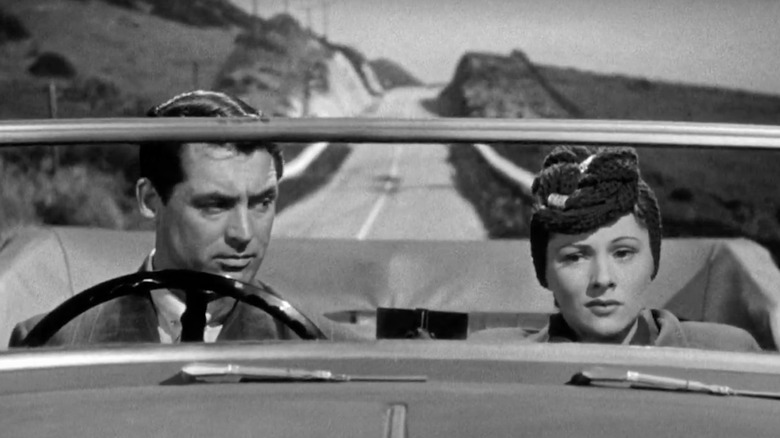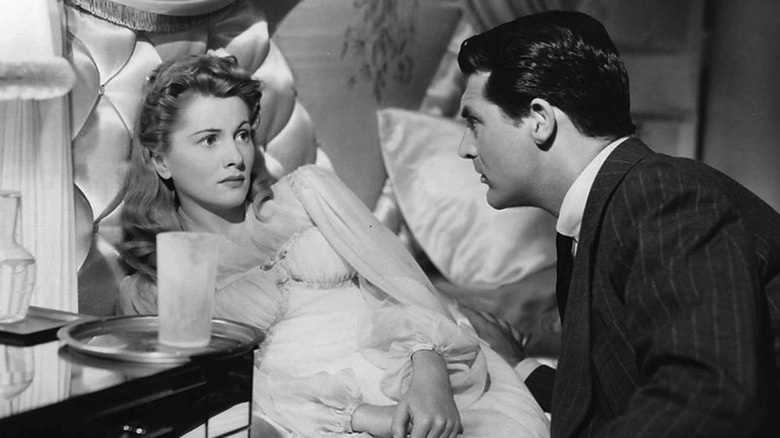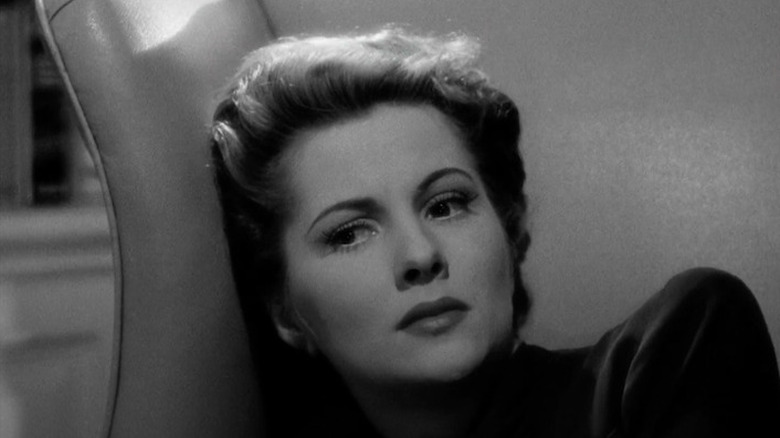The Original Suspicion Ending Alfred Hitchcock Wanted Us To See
When Alfred Hitchcock's "Suspicion" begins, we see nothing but black. Only the charismatic voice of Cary Grant can be heard speaking to us through the dark. "Oh, I beg your pardon. Is that your leg?" he asks. "I had no idea we were going into a tunnel." To be quite frank, neither did we, the viewers, who for the next hour and forty minutes spend our time sympathizing with Lina (Joan Fontaine), the young, bookish blonde who finds herself falling madly in love with Grant's magnetic playboy, Mr. Johnnie Aysgarth.
If you've seen "Suspicion," then you know that Johnnie and Lina run into trouble almost as soon as they get married. Johnnie, who has seemingly never worked a day in his life, prefers to gamble and con his way into money, and Lina, who also apparently ignored every red flag Johnnie frantically waved in her face (seriously, if anyone calls you "Monkey Face" on a first date and then forever after, you need to run), is, understandably, not very happy about this. Through a series of ups and downs where Johnnie screws up, Lina gets politely mad, and then Johnnie seemingly fixes everything, the doomed couple learns to navigate their new life together. However, as Johnnie's good friend Beaky tells Lina, Johnnie "doesn't need more than one second to invent the most howling lie you've ever heard," leading Lina to question nearly everything her husband tells her.
"Suspicion" hinges on the paranoia surrounding both Johnnie's need for money to pay back his debts and Lina's family inheritance that will most definitely solve all their problems if only Johnnie could get access to it early. But when Lina's father dies and leaves her nothing of real monetary value, Johnnie begins trying to find funds elsewhere, and Lina begins suspecting that her devilish husband just might be trying to kill her to collect her life insurance policy. After all, remember his good friend, Beaky? Turns out he mysteriously dropped dead after only a few days on holiday with Johnnie, himself! Gasp!
It's Just a Glass of Milk, Dear
In the end, Lina's paranoia leads to her looking increasingly like one of those "hysterical" women, embodying that terrible trope often meant to discredit women. In the climactic last scene, we are led to believe that he never wanted her dead and that he truly is a good man, albeit slightly (read: deeply) flawed. Lina forgives Johnnie. Johnnie forgives Lina. And the two are seen driving off into the sunset, back to their house where they will presumably live happily ever after. It's a bittersweet ending, one that is meant to leave us wondering whether or not we should believe Johnnie. But it's still relatively clean without much fanfare, easy to dismiss, and slightly disappointing. However, it most certainly is not the original ending that Alfred Hitchcock envisioned when he set out to make the film.
Hitchcock's "Suspicion" is based on a 1932 novel by Francis Iles titled "Before the Fact." While I have not read the actual book, the plot of the film seems like it doesn't stray too far from its source material, but it does alter the ending significantly. In the novel, Lina, completely aware of the fact that Johnnie is murdering friends and family for money, knowingly drinks a poisoned glass of milk given to her by her husband. The acceptance of her inevitable death can be understood in various ways as Lina, who is pregnant at the time she drinks the milk, perhaps choosing to save her unborn child from a life with Johnnie as their father. Or maybe she's crazy, in love, or both.
In the movie, though, the milk is given, but Lina never drinks it. There is no potential child, and the ending is so ambiguous that it leads one to believe all of Lina's paranoia was completely unjustified. But Hitchcock himself actually wanted the movie to end in a way that was much closer to the source material.
What Could Have Been
The famous French director François Truffaut even interviewed Hitchcock about this very thing. During their conversation, Hitchcock explains that "The scene I wanted, but it was never shot, was for Cary Grant to bring her a glass of milk that's been poisoned, and Joan Fontaine has just finished a letter to her mother." In this letter, Lina was to confess the crimes of her husband, alerting her mother to his murderous ways in the hopes that he would be caught before taking any more lives after her own. After finishing the letter, she asks Johnnie to mail it for her before she drinks the milk and dies. "Fade out and fade in on one shot," Hitchcock says. "Cary Grant, whistling cheerfully, walks over to the mailbox and pops the letter in."
This is, in my opinion, an undoubtedly better ending. Yes, Lina meets her demise, but she does so knowing she has also won. In fact, it's such a kicker that Emerald Fennell's Oscar-nominated film "Promising Young Woman" sports a conclusion that feels eerily similar to how "Suspicion" almost ended. It completely turns the story on its head, giving the power back to Lina even in death.
Of course, this ending wasn't the only one that got scrapped before the film's final release. The movie went through many revisions before settling on the ending that has frustrated so many viewers for years. In an article for the "Los Angeles Times," it's explained that, "according to Hitchcock, RKO did not want to portray Cary Grant as a killer," which helps us understand how Hitchcock's dream ending wasn't exactly going to fly. Still, it would have been nice to get that final, sinister shot: a confident Johnnie unknowingly mailing his own incriminating letter just as the movie fades to the very same black from which it began.


